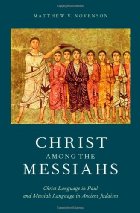 Much New Testament scholarship has come to think that Paul did not believe Jesus was the Messiah in any sense that his contemporary Jews would have understood the word Messiah. Many Pauline scholars have concluded that for the bulk of Paul’s 270 references to Christ (Greek for Messiah) the word meant little more than a personal name, and certainly not the traditional Messiah of Jewish national aspirations.
Much New Testament scholarship has come to think that Paul did not believe Jesus was the Messiah in any sense that his contemporary Jews would have understood the word Messiah. Many Pauline scholars have concluded that for the bulk of Paul’s 270 references to Christ (Greek for Messiah) the word meant little more than a personal name, and certainly not the traditional Messiah of Jewish national aspirations.
Matthew Novenson (Christ among the Messiahs) argues otherwise. The previous posts in this series have sketched his arguments that Paul used the term Christ, not as a personal name nor as a title of office, but as an honorific comparable the honorifics applied to Hellenistic kings and Roman generals and emperors:
- Epiphanes [God Manifest]
- Soter [Saviour]
- Africanus [conqueror of Africa]
- Augustus [Venerable]
. . . . χριστός in Paul is best conceived neither as a sense-less proper name nor as a title of office but rather as an honorific, a word that can function as a stand-in for a personal name but part of whose function is to retain its supernominal associations. Consequently, we ought not to imagine Paul habitually writing χριστός as if it signified nothing, then occasionally recalling its scriptural associations and subtly redeploying it. We ought rather to think of Paul using the honorific throughout his letters and occasionally, for reasons of context, clarifying one of more aspects of how he means the term. (p. 138)
If follows that Novenson argues that Paul’s use of the word Christ (χριστός) is entirely consistent with what it meant among Jews of his day — a world-conquering and liberating Hebrew “Messiah”. Paul has not done away with the traditional messianic idea. Rather, Paul relies upon the same core Scriptural texts that other Jews likewise regarded as foundational to their understanding of who and what the Messiah was. I repeat here from Part 2 those half dozen central texts, none of which, interestingly, contains the word “messiah”. See part 2 for the explanation of why these texts are known to be central for Jewish concepts and discussions about the meaning of the Messiah.
Genesis 49:10
The scepter shall not depart from Judah, nor the commander’s staff from between his feet, until that which is his comes; and the obedience of the peoples is his.
Numbers 24:17
A star will go forth from Jacob; and a scepter will rise from Israel; it will shatter the borders of Moab and tear down all the sons of Sheth.

2 Samuel 7:12-13
I will raise up your seed after you, who will come forth from your body, and I will establish his kingdom. He will build a house for my name, and I will establish the throne of his kingdom forever.
Isaiah 11:1-2
A shoot will come forth from the stump of Jesse, and a branch will grow from his roots. The spirit of YHWH will rest upon him.
Amos 9:11
On that day I will raise up the fallen booth of David, and repair its breached walls, and raise up its ruins, and build it as in the days of old.
Daniel 7:13-14
I saw in the night visions, and behold, one like a son of man was coming with the clouds of heaven. And he came to the Ancient of Days and was presented before him. To him was given dominion and honor and kingship.
In this post I begin to look at some of the passages in Paul’s letters where Novenson finds Paul clarifying his use of the term χριστός/messiah. Novenson attempts to show through these passages that Paul’s use of the term is no different from what we would expect to find in any other Jewish or Christian text that we consider “a messiah text”.
.
Galatians 3:16 “Abraham’s Seed, Which Is Christ”
Now to Abraham and his seed were the promises made. He saith not, And to seeds, as of many; but as of one, And to thy seed, which is Christ. (Gal. 3:16)
But contrast the passage in Genesis that Paul is referencing (Genesis 13:14-17): Continue reading “Christ among the Messiahs — Part 5”
